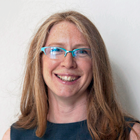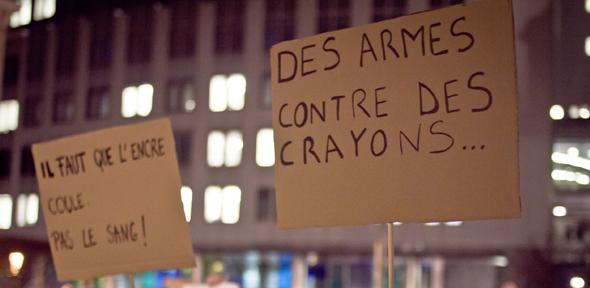14 Sep 2015 | Events, mobile

Banned Books (Photo by Aimée Hamilton / Index on Censorship)
What do you do when someone finds a book in your library offensive and wants to take it off your shelves? How do you remain sensitive to the needs of all while avoiding banning a title? How can you bring attention to the issue of book banning in an effective way?
As part of Banned Books Week (27 September – 3 October), Sage Publications and Index on Censorship are collaborating for a one-hour webinar about protecting and promoting the freedom to read.
When: Tuesday September 29, 5pm UK (9am PST, 10am MST, 11am CST, 12pm EST)
Where: Online
Tickets: Free, but registration is required
Part I: How to use open communication to prevent book challenges
Kate Lechtenberg, teacher librarian at Iowa’s Ankeny Community School District, finds that conversations between librarians, teachers, students, and parents are a key way to creating a culture that understands and supports intellectual freedom. “The freedom to read is nothing without the freedom to discuss the ideas we find in books.”
Part II: How to handle a book challenge after it happens
Kristin Pekoll, assistant director of ALA’s Office for Intellectual Freedom, will share her unique experiences facing several book challenges (and a potential book burning!) when she served as a young adult librarian. How did she address the needs of upset parents and community members while maintaining unrestricted access to information and keeping important books on her shelves?
Part III: How to bring attention to the issue of banned books
Why would a supporter of free speech and open learning purposely ban a book? Scott DiMarco, director of the North Hall Library at Mansfield University, reveals how he once banned a book to shed light on library censorship and what else he is doing to support the freedom to read on his Pennsylvania campus.
Following the three presentations, there will be a Q&A moderated by Vicky Baker, deputy editor of Index on Censorship magazine.
14 Sep 2015 | Events, mobile

Does any topic or depiction get a free ride once it is described as art? And what of artists who go out of their way to shock and outrage, possibly more by a desire for publicity than artistic considerations? Is it possible to draw a line between legitimate artistic or moral criticism of an offensive artwork and calls for the work to be censored? Should artists and arts professionals bear some responsibility for work that is highly likely to generate a heated, even violent, reaction? Are calls for potentially offensive works to display ‘trigger warnings’ and similar advisory labels provide a sincere attempt to avoid upset in sensitive viewers or do they encourage a censorious outlook? Should some topics or language be off limits, irrespective of intent or background of the artist? How should the arts world respond to an offence-sensitive age?
Speakers debate these questions as part of the Battle of Ideas, weekend of high-level, thought-provoking public debate taking place on October 17 and 18 at the Barbican, London.
When: 17 October, 4-5:15pm
Where: Cinema 2, Barbican, London
Tickets: Festival tickets are available from the Battle of Ideas
SPEAKERS
 |
Jodie Ginsberg
Chief executive, Index on Censorship |
 |
Manick Govinda
head, artists’ advisory services, Artsadmin; member, Mayor of London’s Cultural Strategy Group; coordinator, Manifesto Club’s Visiting Artists campaign |
 |
Nadia Latif
theatre director; credits include, Homegrown (NYT); Octagon (Arcola Theatre); Even Stillness Breathes Softly Against A Brick Wall (Soho Theatre) |
 |
Nikola Matisic
opera singer, tenor; founder, Operalabb Sweden; op-ed cultural writer; consultant on operatic culture |
14 Sep 2015 | Events
Anti-terror legislation has been used in several countries to effectively gag free speech about sensitive political issues, but can writing or painting be a terrorist act and what role do they play in radicalisation? Join Index on Censorship CEO Jodie Ginsberg at the Cambridge Festival of Ideas to explore the intersection of art and terrorism.
When: Saturday 24 October: 1:00pm – 2:30pm
Where: University of Cambridge – Faculty of Law – 10 West Road South Cambridgeshire, England CB3 9DZ GB (map)
Tickets: Free, but registration required
Speakers include:
- Pelin Basaran — Turkish cultural policy and management researcher and lecturer and the Director of PARC (Performing Arts’ Research and Creation)
- Jodie Ginsberg, CEO of Index on Censorship
- Professor Anthony Glees, Professor of Politics at University of Buckingham
- Sara Silvestri, Director of Studies in Human Social and Political Science at St Edmund’s College and a Research Associate with the Von Hügel Institute
13 Sep 2015 | Events, mobile
Does free expression have its limits? is one of this year’s Battle of Ideas satellite events, produced in collaboration with east London arts charity, Bow Arts.
For many, the removal of the Lord Chamberlain’s right to censor the London stage in 1968 was hailed as a key liberalising moment of the Sixties. Yet in contemporary Britain there exists an uneasy attitude to how we approach offensive art. A year ago, the Barbican was forced by activists to close down an exhibition that was deemed offensive to black minority communities. More recently, the audience booed an ‘offensive’ rape scene in a performance at the Royal Opera House, and, in response, the company modified the scene. In August, popular US rapper Tyler the Creator was refused a visa to enter the UK on the grounds his work ‘encourages violence and the intolerance of homosexuality’ despite making numerous visits in recent years with comparatively little outrage.
For many in the arts world, the limits of free expression can be difficult to understand. Very few instances of overt censorship exist, yet from the closure of controversial 2004 play Behzti onwards, there has been a growing trend of venues and publishers being willing to pre-emptively withdraw or edit work either on health and safety grounds or for fear of causing offence. Exhibit B protestors, like the booing audience at the ROH, argued that they were legitimately expressing their opposition to work they find insulting. Following the Charlie Hebdo murders in Paris this year, many proclaimed ‘Je Suis Charlie’ in solidarity with offensive speech; yet there was less outcry when controversial comedian Dieudonné M’bala M’bala was arrested for expressing sympathy for the murderers and found his work censored by the French state for routines accused of anti-Semitism and racism.
Is artistic freedom under threat from ‘mob rule’ of community activists and noisy Twitter campaigns by the over-sensitive minority? How should artists respond to claims that their work is offensive? Are ‘trigger warnings’ that alert people to something they might want to avoid a solution? Or do they add to a climate of disapprobation where some ideas are seen as ‘out of bounds’? Are the arts themselves a ‘safe space’ to discuss topics and themes we would not tolerate in our day-to-day lives, or does that defence undermine free expression for all? Isn’t it the role of the artist to go beyond the boundaries, to challenge our perceptions and, on occasion, to cause offence?
When: Monday 5th October, 7-8:30pm
Where: Nunnery Gallery, Bow Arts Trust, 181 Bow Rd, London E3 2SJ (map)
Tickets: £4.89 through Eventbrite
Speakers include:
- Dr Wendy Earle — Impact Development Officer, Birkbeck, University of London; convenor, Institute of Ideas Arts and Society Forum
- Rachael Jolley — Editor, Index on Censorship magazine
- Anshuman Mondal — Professor of English and Postcolonial Studies, Brunel University London
- Kunle Olulode — Director, Voice4Change England and creative director Rebop Productions
- Tom Slater — Deputy editor, Spiked








